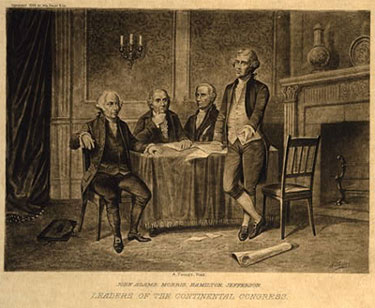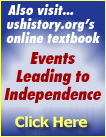
The Declaration of Independence
Lesson Plan

Leaders of the Continental Congress — John Adams, Gouverneur Morris, Alexander Hamilton, and Thomas Jefferson, by Augustus Tholey, c1894
After the passage of the Intolerable Acts, the occupation of Boston and the closing of its harbor, patriot unrest there continued to grow. The British found out that the patriots, who they considered rebels, were hiding weapons in Concord and other locations outside of Boston. General Gates received instructions from London to proceed to Concord secretly, disarm the rebels and arrest their leaders, including Samuel Adams and John Hancock. But the colonists found out about the order from their friends in London before Gates could move his soldiers to Concord. A colonial militia met him at Lexington on the road to Concord, where at sunrise on the morning of April 19, 1775, the “shot heard round the world” was fired.
The Continental Congress met again. Less than a month after warfare began in Boston, they met in Philadelphia on May 10th, this time in the Pennsylvania State House. The questions now were different than they were when the First Continental Congress adjourned in October of 1774 and so was the membership. Benjamin Franklin was now there and so was John Hancock. Less than two weeks after the delegates came together, Paeyton Randolf, the President of the Congress, went back to Virginia to preside over the House of Burgesses and he was replaced by thirty-two year old Thomas Jefferson. John Hancock was then elected as President of the Congress to take Randolf’s position. By July of 1775, all 13 states were represented in the Congress, where only 12 of the 13 had been present for the First.
The first and foremost question facing this Second Continental Congress was how would the colonists meet the military threat of the British? It was agreed that a Continental Army would be created. John Adams recommended and the Congress commissioned George Washington of Virginia to be the supreme commander, who chose to serve without pay. How would supplies be paid for? The Congress authorized the printing of money. Before the leaves had turned, Congress had even appointed a standing committee to conduct relations with foreign governments, should the need ever arise to ask for help. No longer was the Congress dealing with mere grievances. It was a full-fledged governing body.

Jonathan Trumball's painting of the five-man drafting committee of the Declaration presenting its work to Congress.
Still, in May of 1775 the majority of delegates were not seeking independence from Britain. Only radicals like John Adams were of this mindset. In fact, that July Congress approved the Olive Branch Petition, a direct appeal to the king. The American delegates pleaded with George III to attempt peaceful resolution and declared their loyalty to the Crown. The King refused to receive this petition and instead declared the colonies to be in a state of rebellion in August. Insult turned to injury when George ordered the hiring of Hessian mercenaries to bring the colonists under control. Americans now felt less and less like their English brethren. How could their fellow citizens order a band of ruthless, foreign goons, to fight them? The moderate voice in the Continental Congress was dealt a serious blow.
To prevent the American Revolution, King George might have considered the colonists' Olive Branch Petition? Why did you think he refused to listen to it?
As the seasons changed and hostilities continued, cries for independence grew stronger. The men in Philadelphia were now wanted for treason. They continued to govern and hope against hope that all would end well. For them, the summer of 1776 brought the point of no return.
On June 7, 1776, Richard Henry Lee introduced a resolution to the Congress that declared the thirteen colonies "free and independent states." Congress did not act on the resolution immediately. A vote was set for early July. In the meantime it seemed appropriate that some sort of explanation was in order for such a bold act. A subcommittee of five, including Benjamin Franklin, John Adams and Thomas Jefferson and also Robert Livingston and Roger Sherman, was selected to choose the careful wording. Such a document must be persuasive to a great many parties. Americans would read this and join the patriot cause. Sympathetic Britons would read this and urge royal restraint. Foreign powers would read this and aid the colonial militia. They might, that is, if the text were convincing. After discussing the general outline the document should follow, the five agreed that Jefferson was the most talented writer. They would advise on his prose.
Start page | The Document | A Reading | Signers | Related Information | Jefferson's Account | Declaration House | Declaration Timeline | Rev. War Timeline | More Resources | Lesson Plan |




